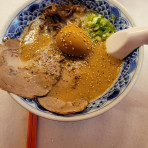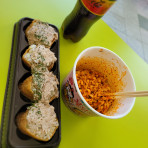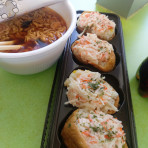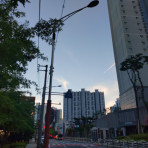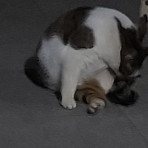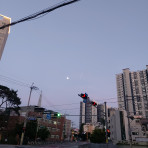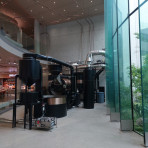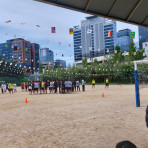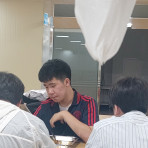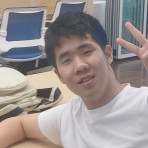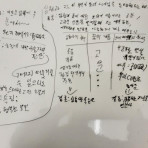Prison authorities refuse to sell canteen food to jailed blogger
본문
Wed, 14 Feb 2024 14:40:59 -0500

Prison authorities have refused to sell jailed Vietnamese prisoner of conscience Tran Huynh Duy Thuc food from the facility’s canteen, a week after he voluntarily ended a hunger strike, members of his family said Wednesday.
Convicted in 2010 on charges of plotting to overthrow the government, Thuc is serving a 16-year sentence for writing online articles criticizing Vietnam’s one-party communist state.
Thuc is now in the final year of his sentence, counting the time of his detention in 2009, and is in poor health. He has staged other hunger strikes in the past to protest conditions at Prison No. 6 in Nghe An province. He began his latest hunger strike on Jan. 27.
In Vietnam, prisoners are fed basic prison food, but can also buy higher quality food from the canteen, and inmates are allowed to receive non-perishable food from their families. But it’s not unusual for jail authorities to deprive political prisoners of canteen food, hot water, medicine and outside health care as a means of further punishment.
Thuc ended his hunger strike on Feb. 2 after canteen workers finally sold him something to eat. But a week later, they again refused to sell him food, saying that he had exceeded the monthly limit for purchases, even though he had not bought enough to meet his dietary needs, his relatives told Radio Free Asia, two days after a prison visit on Feb. 12.
Canteen workers said Thuc purchases exceeded the monthly limit of 1.7 million dong (US$70), and he could only buy more food beginning in March, according to his family.
Thuc has only one package of instant noodles and about 8 kilograms (18 pounds) of other food his relatives gave him on Monday.
Family is worried
Tran Huynh Duy Tan, Thuc’s younger brother, said the family was happy when Thuc ended his hunger strike, but now they are worried about the possibility that he will resume it. They also expressed concern that the food they gave him will only last a few days.
“The family is very worried that he will continue to not have enough food,” Tan said. “He said he would continue to protest by going on another hunger strike if the prison continued to mistreat him, as it is doing now.”
RFA was unable to reach prison officials for comment.
During his recent hunger strike, Thuc became exhausted and passed out, his family said. He also complained of being constantly cold, although he had not complained previously about the winter weather in Nghe An.
Thuc’s family called on Vietnamese authorities as well as human rights organizations and the governments of democratic countries to pressure the prison to stop treating Thuc harshly.
Prison authorities have continued to restrict access to hot water for Thuc and his cellmate, fellow political prisoner Dang Dinh Bach, Thuc’s relatives said.
Bach, a lawyer and the director of the environmental group that had been campaigning to reduce Vietnam’s reliance on coal, was arrested in July 2021 and sentenced to five years for “tax evasion.”
When the warden said Thuc could only exchange instant noodles for boiling water because the amount of water was limited, Thuc refused, his family said.
Bach's hunger strike
Bach also has gone on hunger strikes to protest prison conditions and the violation of his right to send and receive letters, as well as to support Thuc.
United Nations human rights experts in Geneva, Switzerland, on Wednesday urged the Vietnamese government to stop convicting and mistreating human rights defenders, after Bach began another hunger strike.
Bach, who is on a vegetarian diet for health reasons, depends on his family for food, and is denied access to books, hygiene items, hot water and traditional medicines, the U.N. experts said in a statement. Prison officials also restrict his communication with and visits from his relatives and lawyer.
“Mr. Bach should not have to embark on a hunger strike to demand strict enforcement of laws and dignified prison conditions,” the U.N. experts said. “Deprivation of liberty and mistreatment in prison should not be used as a tool by the Vietnamese government to silence human right defenders and civil society members working on sensitive issues.”
“We strongly urge the Vietnamese authorities to stop mistreating Mr. Bach in detention and ensure his conditions and access are in accordance with Vietnam’s international human rights obligations,” they said.
RFA was unable to reach Bach’s family to learn about his current situation.
Translated by Hahn Seide. RFA Vietnamese. Edited by Roseanne Gerin and Joshua Lipes.

Prison authorities have refused to sell jailed Vietnamese prisoner of conscience Tran Huynh Duy Thuc food from the facility’s canteen, a week after he voluntarily ended a hunger strike, members of his family said Wednesday.
Convicted in 2010 on charges of plotting to overthrow the government, Thuc is serving a 16-year sentence for writing online articles criticizing Vietnam’s one-party communist state.
Thuc is now in the final year of his sentence, counting the time of his detention in 2009, and is in poor health. He has staged other hunger strikes in the past to protest conditions at Prison No. 6 in Nghe An province. He began his latest hunger strike on Jan. 27.
In Vietnam, prisoners are fed basic prison food, but can also buy higher quality food from the canteen, and inmates are allowed to receive non-perishable food from their families. But it’s not unusual for jail authorities to deprive political prisoners of canteen food, hot water, medicine and outside health care as a means of further punishment.
Thuc ended his hunger strike on Feb. 2 after canteen workers finally sold him something to eat. But a week later, they again refused to sell him food, saying that he had exceeded the monthly limit for purchases, even though he had not bought enough to meet his dietary needs, his relatives told Radio Free Asia, two days after a prison visit on Feb. 12.
Canteen workers said Thuc purchases exceeded the monthly limit of 1.7 million dong (US$70), and he could only buy more food beginning in March, according to his family.
Thuc has only one package of instant noodles and about 8 kilograms (18 pounds) of other food his relatives gave him on Monday.
Family is worried
Tran Huynh Duy Tan, Thuc’s younger brother, said the family was happy when Thuc ended his hunger strike, but now they are worried about the possibility that he will resume it. They also expressed concern that the food they gave him will only last a few days.
“The family is very worried that he will continue to not have enough food,” Tan said. “He said he would continue to protest by going on another hunger strike if the prison continued to mistreat him, as it is doing now.”
RFA was unable to reach prison officials for comment.
During his recent hunger strike, Thuc became exhausted and passed out, his family said. He also complained of being constantly cold, although he had not complained previously about the winter weather in Nghe An.
Thuc’s family called on Vietnamese authorities as well as human rights organizations and the governments of democratic countries to pressure the prison to stop treating Thuc harshly.
Prison authorities have continued to restrict access to hot water for Thuc and his cellmate, fellow political prisoner Dang Dinh Bach, Thuc’s relatives said.
Bach, a lawyer and the director of the environmental group that had been campaigning to reduce Vietnam’s reliance on coal, was arrested in July 2021 and sentenced to five years for “tax evasion.”
When the warden said Thuc could only exchange instant noodles for boiling water because the amount of water was limited, Thuc refused, his family said.
Bach's hunger strike
Bach also has gone on hunger strikes to protest prison conditions and the violation of his right to send and receive letters, as well as to support Thuc.
United Nations human rights experts in Geneva, Switzerland, on Wednesday urged the Vietnamese government to stop convicting and mistreating human rights defenders, after Bach began another hunger strike.
Bach, who is on a vegetarian diet for health reasons, depends on his family for food, and is denied access to books, hygiene items, hot water and traditional medicines, the U.N. experts said in a statement. Prison officials also restrict his communication with and visits from his relatives and lawyer.
“Mr. Bach should not have to embark on a hunger strike to demand strict enforcement of laws and dignified prison conditions,” the U.N. experts said. “Deprivation of liberty and mistreatment in prison should not be used as a tool by the Vietnamese government to silence human right defenders and civil society members working on sensitive issues.”
“We strongly urge the Vietnamese authorities to stop mistreating Mr. Bach in detention and ensure his conditions and access are in accordance with Vietnam’s international human rights obligations,” they said.
RFA was unable to reach Bach’s family to learn about his current situation.
Translated by Hahn Seide. RFA Vietnamese. Edited by Roseanne Gerin and Joshua Lipes.
좋아요3
이 글을 좋아요하셨습니다
관련링크
등록된 댓글이 없습니다.

